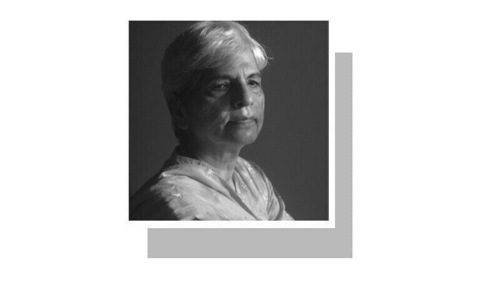
The young man felt lost in a sea of people as he stood next to his elder brother, waiting for his turn to pay his last respects to the poet. He had noticed a sudden change around him, a change that threatened to deprive him of his special relationship with the man he was there to bid farewell to.
It was as if hordes had gate crashed the exclusive club the young man had considered himself to be a silent member of until a day ago. He was jealous and wished the poet to rise and say a line that would disperse the wreath-laden outsiders who had now gathered around his grave. Something that would ensure forever his place among the minority and the marginalised.
That is how Faiz Ahmed Faiz began the new phase of his life posthumously at the Model Town graveyard on November 21, 1984. This phase was to in time earn him admirers across ideological lines. He continued to be celebrated as a poet of romance and revolution; only the romantics and the revolutionaries changed their hue from red to pink to whatever colour that suited them in a particular situation.
A Faiz who was no more around physically did not appear that menacing to the establishment in Pakistan; in fact they quite liked him and pampered him and thought of him as a dependable companion for all types of situations. As the ideological antithesis that Faiz’s once equally maligned friends in the Soviet Union presented weakened in the 1980s and then faded out, this facilitated his rehabilitation as the poet of all ‘good causes’.
Perhaps this was a good sign for all those who had always claimed and demanded universal acceptance for the poet’s genius. For the young man who stood by his grave that November day in 1984, this was an ideological betrayal, and therefore the worst form of betrayal. He would have rather lived in the dream that he had wandered into in the period immediately following Faiz’s passing on.
Even as one line followed by some members of Pakistan’s literary world sought to restore to Faiz Ahmed Faiz his piety, Lahore soon after his death was a much happening place for the rightly-inclined. The air was laden with verses from him and the people were ready to go to a new mela in his name. The not so big group of people gathered at the Garhi Shahu residence of Mumtaz Daultana soon after Faiz’s death was an experiment that went well. This emboldened his friends to launch an annual event called Faiz Amn Mela, an assortment of seminars and music shows that climaxed with truly mela-like festivities on the Lawrence Gardens stage.
Iqbal Bano, Nayyara Noor, Tina Sani… it was as if they had suddenly come out of the closet, as if Faiz had linked them with the long-waiting people in the eighth year of General Ziaul Haq’s martial law. That February evening at the Alhamra on The Mall, a group of them literally begged the organisers to let them into an already overflowing hall where Iqbal Bano was lording over the audience. Her voice raised to match the promise in Faiz’s words, she forced the rulers down from their thrones and threw the crowns in air. Revolution was such a personal feeling at the time.
For the young man who had stood at Faiz’s grave and wondered what to expect next, it was not something that others brought into your life, but something that you did yourself. It did not have to be on a big scale; the Alhamra hall that reverberated with Iqbal Bano’s voice was sufficient space for the purpose. Why did the privacy of that space have to be violated? Why?
Over the next few years, if someone would recite a couplet anywhere in Pakistan, the audience would feel the urge to associate it with Faiz. “Is this one by Faiz?” they would ask, in case they were not already dead sure that the thought they had come across was by, who else, but by “the most famous Urdu poet after Ghalib and Iqbal” Faiz was always popular, now he became part of a fashion statement.
The increase in the pace of globalisation necessitated or simply aided the thrust for universalisation of the acceptance of Faiz. The mela of the marginalised his legacy had given birth to needed greater space to thrive.
The young man who had stood at Faiz’s grave and claimed more or less exclusive rights on him, was a bit puzzled, a wee bit dismayed and in due time, put off. “We are not going to shout slogans against anyone,” the voice from the stage resonated in the ground. It was not in response to a slogan chanted out of the blue. The same anti-America shouts were a feature of the Faiz melas right since it was first held in 1985.
Much had transpired in the world between then and glasnost beckoned. In our part of the globe itself, there had been quite a transformation. Zia the dictator was no more and in his place, a Pakistan People’s Party government ruled on the strength of popular mandate. Chaudhry Aitzaz Ahsan who had made a habit of reciting Faiz’s tribute to the Iranian students at previous melas was a minister now. He stood a whisper away from the voice as it told the overexcited crowd in the Railways to please refrain from making the standard anti-imperialist noises that they had been raised on.
The young man who had once promised himself a revolution while standing at Faiz’s grave was angry and he lost interest. It is doubtful however if he could have even otherwise scuttled the process that was to eventually lead to universal usage of Faiz.
In the 100th year since his birth, the process is almost complete. Faiz Ahmed Faiz has gone through the purification regime and stands cleansed of his ideological sins – at a 26 years’ distance from the young man who is stuck where he was on November 21, 1984.










































